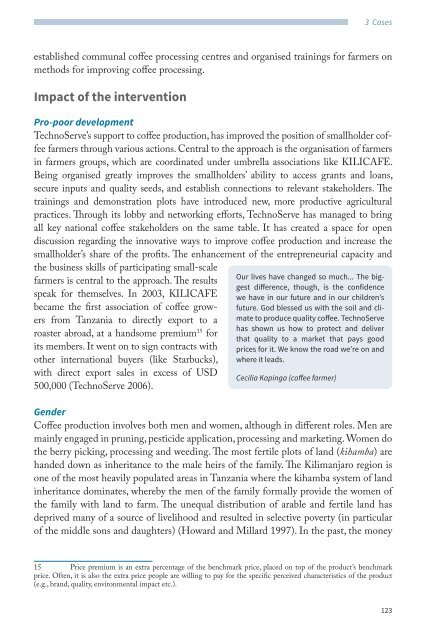Regional Markets
56ec00c44c641_local-markets-book_complete_LR
56ec00c44c641_local-markets-book_complete_LR
Create successful ePaper yourself
Turn your PDF publications into a flip-book with our unique Google optimized e-Paper software.
3 Cases<br />
established communal coffee processing centres and organised trainings for farmers on<br />
methods for improving coffee processing.<br />
Impact of the intervention<br />
Pro-poor development<br />
TechnoServe’s support to coffee production, has improved the position of smallholder coffee<br />
farmers through various actions. Central to the approach is the organisation of farmers<br />
in farmers groups, which are coordinated under umbrella associations like KILICAFE.<br />
Being organised greatly improves the smallholders’ ability to access grants and loans,<br />
secure inputs and quality seeds, and establish connections to relevant stakeholders. The<br />
trainings and demonstration plots have introduced new, more productive agricultural<br />
practices. Through its lobby and networking efforts, TechnoServe has managed to bring<br />
all key national coffee stakeholders on the same table. It has created a space for open<br />
discussion regarding the innovative ways to improve coffee production and increase the<br />
smallholder’s share of the profits. The enhancement of the entrepreneurial capacity and<br />
the business skills of participating small-scale<br />
farmers is central to the approach. The results<br />
speak for themselves. In 2003, KILICAFE<br />
became the first association of coffee growers<br />
from Tanzania to directly export to a<br />
roaster abroad, at a handsome premium 15 for<br />
its members. It went on to sign contracts with<br />
other international buyers (like Starbucks),<br />
with direct export sales in excess of USD<br />
500,000 (TechnoServe 2006).<br />
Our lives have changed so much... The biggest<br />
difference, though, is the confidence<br />
we have in our future and in our children’s<br />
future. God blessed us with the soil and climate<br />
to produce quality coffee. TechnoServe<br />
has shown us how to protect and deliver<br />
that quality to a market that pays good<br />
prices for it. We know the road we’re on and<br />
where it leads.<br />
Cecilia Kapinga (coffee farmer)<br />
Gender<br />
Coffee production involves both men and women, although in different roles. Men are<br />
mainly engaged in pruning, pesticide application, processing and marketing. Women do<br />
the berry picking, processing and weeding. The most fertile plots of land (kihamba) are<br />
handed down as inheritance to the male heirs of the family. The Kilimanjaro region is<br />
one of the most heavily populated areas in Tanzania where the kihamba system of land<br />
inheritance dominates, whereby the men of the family formally provide the women of<br />
the family with land to farm. The unequal distribution of arable and fertile land has<br />
deprived many of a source of livelihood and resulted in selective poverty (in particular<br />
of the middle sons and daughters) (Howard and Millard 1997). In the past, the money<br />
15 Price premium is an extra percentage of the benchmark price, placed on top of the product’s benchmark<br />
price. Often, it is also the extra price people are willing to pay for the specific perceived characteristics of the product<br />
(e.g., brand, quality, environmental impact etc.).<br />
123


